- Home
- S. E. Hinton
That Was Then, This Is Now Page 5
That Was Then, This Is Now Read online
Page 5
"I must still be high." Mark's voice broke the stillness. "I don't know why I'm blabbering on like this."
"I always think of you as my brother," I said. I saw Mark's face in the moonlight. He was smiling.
4
Mark wasn't feeling any better the next day. When I asked him if his head still hurt he said, "Yeah." That was typical of Mark, who never admitted to being in real pain. I called the doctor from a pay phone, and all he said was that Mark would be in pain for a couple of days and that I should keep him quiet and give him aspirin. He was a big help.
I took back Charlie's car and told him what had happened. He didn't seem too interested, but he was having his own troubles. He'd got his draft notice.
I got home as soon as I could. I hated to leave Mark there all by himself. I didn't know which was bothering him most--the pain in his head or having to stay in bed. He probably would have tried to get up in spite of the doctor's orders, but he couldn't even sit up without getting dizzy. We didn't have the TV any more and Mark couldn't read too well. He couldn't even seem to get interested in poker.
"Why don't you read me a book?" he suggested, after I had racked my brains trying to think of something to do.
"Read you a book?"
"Yeah. Don't you remember when we were little? You used to read me books all the time."
Mark was too lazy or too uninterested to read himself; he had never bothered to learn how to read very well in the first place. This probably accounted for his poor grades at school, because he was every bit as smart as I was.
I had read cowboy books to him when we were little--we were both going to be cowboys--books like Lone Cowboy by Will James. We'd climb the tree in the back yard and I'd read aloud, and then we'd play cowboys. "Do you remember? . . ." Mark said.
Somehow we spent the whole afternoon talking about when we were little kids. We had played a kid's version of gang fighting called "Civil War," and then later we had got in on the real thing. We fought with chains and we fought barefisted and we fought Socs and we fought other grease gangs. It was a normal childhood. I used to be able to get all uptight about a fight, look forward to it. Nowadays it was getting a little boring.
Mark had a great memory--better than mine, which is pretty good--and he brought up little goofy things we had done when we were young that I'd forgotten about. Like the time we climbed over the back fence at a drive-in movie and got caught. The drive-in manager put us in the back of a pickup truck to take us to the police station, but we jumped out while he was doing thirty miles an hour. Somehow neither of us was killed. We always wondered what that guy thought when he got to the police station and there was nobody in his truck.
We'd get up on the roof of a two-story shopping center and shoot water pistols at the people passing below, then have a good time running from the cop Mark had so thoughtfully drenched. We always had a car in those days, thanks to Mark's hot-wiring abilities. We'd take something that looked fast and go to the expressway and drag. It was sheer luck that when Mark was finally caught doing this, he was alone. I could have been booked too.
And mixed up between these episodes were poker games, sometimes drunken ones lasting all night, and pool games--I was a pool hustler at a very early age. And dates and parties and beer blasts on the dry riverbed. We were always with a bunch of guys. Sometimes it was the same bunch for a year or two, then people would drift away--usually if anyone got a steady girl it cut down on a lot of goofing around with the guys--and different people would drift in. But Mark was always the hub of this circle of people, and I was always with Mark.
"We've had some good times, huh, Bryon?" Mark broke the silence. I guess we both had been reminiscing.
"Yeah," I said. I was sitting in my favorite position on the bed, leaning against the wall with my knees up, resting an elbow on my knee, and dangling a cigarette.
"Do you ever get the feeling that the whole thing is changin? Like somethin' is coming to an end because somethin' else is beginning?"
"Yeah, I know exactly what you mean. Like now I couldn't care less about Angela, and I can remember when she seemed like the most important thing on earth."
"That's it!" Mark said excitedly, forgetting about his head and starting to sit up. He remembered suddenly, because he yelped and lay back down with a rueful grin. "Like we got into those gang fights--it was so important, it was the whole world if we won or lost--and the buddies we had then. We were like brothers, not just you and me, but all of us together. We woulda died for each other then. And now everybody's kinda slipped away, and then we woulda died for each other. Really, man, remember? It was great, we were like a bunch of people makin' up one big person, like we totaled up to somethin' when we were together."
"Now we total up to something by ourselves just as easy," I said. I understood exactly what he was talking about. Mark had the habit of thinking the way I did; the difference was that he said it and I usually didn't.
"Yeah, but still, don't you kinda miss that one-for-all, all-for-one routine? It's kinda sad, really, when you get to where you don't need a gang--I mean, like you did before."
"It's kind of a good thing too," I said, "when you know your own personality so you don't need the one the gang makes for you."
"Yeah," Mark sighed, "but there's a difference. I wonder what the difference is?"
"The difference is," I said evenly, "that was then, and this is now."
Mark flashed me that lion-like grin. "Bryon, you are brilliant."
We didn't say much the rest of the afternoon. We were thinking.
*
Mark missed one day of school. He still wasn't feeling real great by Monday, but I decided I could go anyway. He wasn't sick enough for me to stay home with him.
The fight had made Mark something of a hero, and the whole story was going around school in various versions, all different. Some of them were pretty funny. Everyone was mad at Angela, sympathized with Curtis, who had been in a lot of trouble before and was a kind of folk-hero, and made a big deal out of Mark's stepping in to keep the fight fair. When people asked me what happened, I told them, but I could see that they were going to believe what they wanted to believe and hearing the truth wasn't going to change their minds. People are generally like that.
I was in a funny mood Monday. That talk I had had with Mark really got to me. I felt like I was standing apart from all the rest of the kids and just watching. It was like I could see through them--see what they were thinking and why they did things--and it was really weird.
I went to a big high school. It graduated about seven hundred kids, and the senior class was the smallest class, so you can see how big it really was. Its district included a real crummy part of town--ours--and a pretty ritzy part of town. This can make for problems. It used to anyway, with the Socs beating up the greasers, but in these days, with all that love, peace, and groove stuff, the fights had slacked off. Besides, it was hard now to tell a Soc from a greaser. Now the greasers wore their hair down on their foreheads instead of combed back--this went for Mark and me too--and the Socs were trying to look poor. They wore old jeans and shirts with the shirttails out, just like the greasers always had because they couldn't afford anything else. I'll tell you one thing though: what with fringed leather vests and Levi's with classy-store labels in them, those kids were spending as much money to look poor as they used to to look rich. It was crazy.
There was another crazy thing I noticed for the first time that Monday. I'm a smart kid, so I was put in classes with other smart kids. Most of these guys were what we used to call Socs. They were always friendly toward me, and I'd gone to quite a few parties at their houses and dated some of their chicks. All this time I had thought, Well, they like me. I'm big, friendly, wise-guy Bryon, so they like me. Now I saw it clearly. They didn't like me. The truth is they were probably scared of me. But I was a "poor white," and they were "liberals," so I got invited to the parties so everyone could see what hip, hip people they were. I had always wondered why at t
hose parties people were always trying to get me to talk about politics and junk I'd never heard of. I don't keep up on those things. When I read, I like stuff like Hemingway--newspapers bore me. I lead with my left, and that's about as much as I know about Left, Right, and so on. I have a vague notion that the Left is Hippie and the Right is Hick, but I really don't know much else.
Now I knew. That Monday I could see through people and I knew what was going on. I figured if I'd been a black I'd have been twice as popular, but integration in our school wasn't really swinging yet, and there weren't very many Negroes there. These guys would probably have offered me their sisters' hands in marriage if I'd been black. I knew some Negroes, some really cool fighters out in Brumley. I'd have to remember to take a couple along to the next party with me Then they could talk about the Black Revolution and the Panthers--which they knew as much about as I did Right and Left.
I walked around the whole day laughing to myself. It was just that day--the next day I wondered what had hit me to make me act like that; and when I saw these Soc guys, they were just guys, friends of mine, and of course they asked me to their homes because we were friends--we were in the same English class and we got along. They were sincerely trying to change the world for the better, that was why they talked politics. They wore those clothes because that was their bag. That's what I thought the next day.
But not Monday. That Monday I knew.
*
Mark got better and went back to school. He went to school for lack of something better to do, because he sure didn't dig it the way I did. We didn't usually see each other much at school; we were never in the same classes. We walked to school together and usually got a ride home together with someone, but lots of times we didn't see each other until we got home.
So when Mark didn't show up for a while one afternoon the following week, I wasn't worried. He could have been any number of places. I didn't happen to guess the right one. He was at the police station.
I didn't know about it until Terry Jones came by. Terry was short, round, and a real nut.
"Bryon!" he yelled as he came running through the front door. "Hey, Bryon, did you hear what happened to Mark?"
I was making a peanut-butter-and-honey sandwich. I didn't get shook because something is always happening to Mark.
"What? And calm down, for Pete's sake. I ain't deaf."
"O.K.," Terry said carelessly. He sat down in a chair and looked around. "Having dinner?"
"Cut it, man. What happened to Mark?"
"Not much. He just got caught driving the principal's car."
I gagged. "What?" I said when I could talk. "He got caught doing what?"
"The principal had to leave school early today for some reason. He gets to his parking place, and no car. And then guess who shows up with it? Your friend and mine, Mark."
"You gotta be kiddin'," I begged. "Man, Terry, tell me you're kiddin'. Mark's on probation now for car stealing."
"That's the reason he was driving it," Terry said. "Can I have a sandwich?"
"Here," I shoved the peanut butter, honey, and bread at him. "Fix it yourself. Only first, if you don't want your head busted, tell me what's going on."
"I happened to be standing around when the aforementioned incident occurred." It figured. Terry was usually standing around. "And I hear Mark explain to the principal while the cops are bein' called that he has to go down to see his probation officer once a week and tell him how he ain't gonna steal no more cars. The deal is, he don't have no way to get downtown--there ain't no buses at that time, he don't have a car, and there ain't enough time to walk since he's on his lunch hour. So he borrows the principal's car, drives down to see the probation officer, and drives back. He's been doing this since school started, and if the principal didn't have to leave early today, he'd be doin' it yet."
"I don't believe it," I said slowly. "He's gonna be in jail for the rest of his life."
"I doubt it," Terry said, starting in on his second sandwich. "The principal was laughing by the time Mark got through talking to him."
I breathed a sigh of relief. Mark would come through. Even this. As if to prove this to me, Mark came strolling in. "Guess where I been? Got anything else to eat?"
"Let me see," I said. "Ah, yes. I see it in a vision--you were at the police station explaining how you had to borrow the principal's car because you had to see your probation officer."
"Terry told you, huh? Well, it's all straightened out now. The probation officer drives down to pick me up from now on. It was just one of those failures to communicate."
Mark sat down across the table from me, eating an apple. He was trying to look ashamed of himself, but it just wasn't coming off. I was trying to look disgusted with him, but that wasn't working either.
"I'm sorry," he said finally.
"No you ain't," I said. We were quiet for a while. Terry got up and left--he must have thought me and Mark were going to have a fight.
"Listen, man," Mark began, but I cut him off.
"Shut up, O.K.? As long as they ain't doin' nothin' to you, it's O.K. I guess you can get away with anything."
Mark leaned back in his chair. The sun came through the small kitchen window and glinted on his eyes, turning them a bright yellow. "I guess so," Mark said. He smiled, like an innocent lion.
5
The first time Mom knew anything about Mark being hurt was when we visited her in the hospital and she saw the stitches in his head. They were real noticeable against his gold hair. She just said, "How did that happen?" And Mark answered, "Fight," and the subject was dropped. That was a good thing about Mom--she'd cry over a dog with a piece of glass in his paw but remained unhysterical when we came home clobbered. About fights, she'd say, "Don't fight at school, you'll get expelled." About drinking, "I'd rather you didn't," so around her we didn't. She didn't know about some of the rest of the stuff we did--the pool games, the poker, the gang fights, the dry river-bed parties--but in that respect she wasn't any different from any other mother. Parents never know what all their kids do. Not in the old days, not now, not tomorrow. It's a law.
We stopped in to see that kid Mike, the one who'd been beaten up so bad. He looked worse than he had before; he said his old man had been in and chewed him out. The doctor had promised him that his father wouldn't be allowed to come to see him any more, but he was still shook.
He looked like a nervous wreck as well as a physical one. "I wish I was dead--or somebody else," he said. You just don't say things like that. I didn't stay long; things like that depress me. Mark stayed on to see if he could cheer up Mike. I wanted to go to the snack bar and see Cathy anyway.
She looked as cute as ever. She said, "Hi, Bryon," not too eager but friendly enough. I had called her a few times in the last couple of weeks and walked to her house to see her, but we hadn't been out. I didn't have a car and Charlie was still so mad about getting his draft notice that I didn't have the nerve to ask him for his car again. As a matter of fact, he was in such a rotten mood that I stayed away from his place altogether. We were friends, and I didn't think he'd ever take his temper out on me, but with big guys, it's safer to be careful.
"I'm on my break now," Cathy said, looking at the clock. This was an invitation for me to buy her a soda, so I said obligingly, "Want a Coke?"
"I knew you'd say that," Cathy said. She came around to my side of the counter and sat down next to me. I never could get over her honesty. Girls are usually careful not to let you know what they're thinking. Cathy hadn't dated before, maybe that was why she was so open. She didn't tell me that about not dating, of course. I found out from M&M. I found out a lot of things from M&M. I have never known anyone so unsuspicious as that little kid. He'd trust Jack the Ripper. He was a believer.
I kept comparing Cathy to Angela, I guess because out of all the girls I've dated--I started at thirteen--they were the two I liked best. I don't know if "like" is the right word for how I felt about Angela. I had been wrapped up in her, I had to se
e her every day, I had to talk to her ten times a day on the phone; but now, looking back on it, I don't remember ever liking her. Cathy was smart, but Angela knew more. That was strange. They both had guts--I can't stand chicken girls--but in different ways. Cathy wasn't afraid to say what she thought; Angela wasn't afraid to do what she wanted. Angela wasn't afraid of any boy on earth; Cathy wasn't afraid of any other girl. They were both gutsy in different ways.
My main problem with Cathy was that she liked me--and I wanted her to be crazy about me. I'm like that. I have a very bad ego hang up.
"Guess who called me?" Cathy said. "Ponyboy Curtis. He wanted to go out Friday night."
"No kiddin'," I said, while thinking, I'll murder that guy. "What'd you tell him?"
"I said I was busy. Am I?"
I was stunned again but didn t show it. "You are. I'll pick you up at seven." I had no idea what I was going to pick her up in, or where we'd go after I did pick her up, but I figured I could work that out later.
*
"We're goin' hustlin'," I told Mark as we walked home, trying to hitch a ride. This time no friendly hippie showed up to give us a lift.
"O.K."
"Tonight--for money."
"You'll need some money to get started with," Mark said, lighting a cigarette.
"I'll get it."
We ran into M&M at the drugstore, and as usual he was chomping on that crazy candy. At least he wasn't staring into the bag like it contained the eighth wonder of the world.
"I need some money," I said, deciding not to beat around the bush. "You got any?"
He looked at me with those serious, war-orphan eyes. "I got five dollars," he said. "I raked some lawns to get it."
I used to think he and Cathy looked an awful lot alike, but not any more. Sure, they both had those big charcoal eyes and matching hair, but Cathy laughed more, her expression usually twinkled with humor. M&M rarely smiled, and he always looked puzzled, serious, and trusting.
"That's a good deal. Can you loan it to me? Just for tonight. I'll pay you back tomorrow."
He pulled out his billfold and took all the money out of it. "Be sure not to forget to give it back tomorrow. I need it. O.K.?"

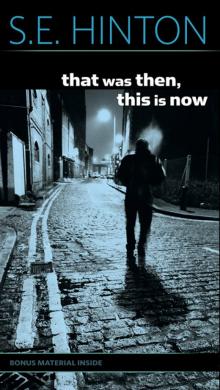 That Was Then, This Is Now
That Was Then, This Is Now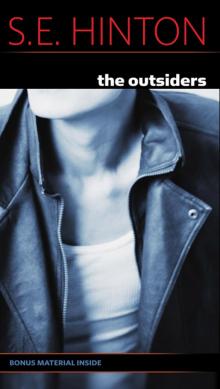 The Outsiders
The Outsiders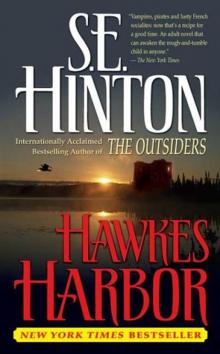 Hawkes Harbor
Hawkes Harbor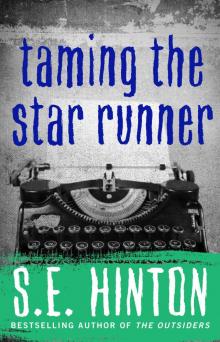 Taming the Star Runner
Taming the Star Runner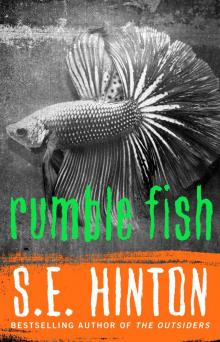 Rumble Fish
Rumble Fish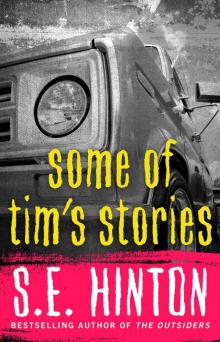 Some of Tim's Stories
Some of Tim's Stories